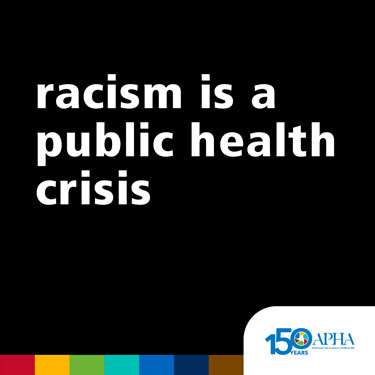More than 250 declarations proclaiming racism a public health crisis have been passed in localities across the U.S., according to an APHA tracking project.
As of July, leaders in 21 states, 89 counties and 146 cities have acknowledged that racism is a threat to health and adopted statements declaring it an emergency or crisis, APHA announced July 25.
“These declarations acknowledge the impact that systemic racism has on all aspects of health,” said Tia Taylor Williams, MPH, CNS, director of APHA’s Center for Public Health Policy. “Many jurisdictions are using these declarations to spur meaningful and strategic actions toward health and racial equity."
Staff from APHA’s Center for Public Health Policy have been monitoring declarations made by state legislatures, mayors, governors, county boards, city councils and other authorities and logging them on an online mapping tool, at www.apha.org/racism-declarations.
The map links to the declarations and indicates when they were passed. Public health advocates are encouraged to use the tool to check if a declaration has been made in their community. If not, they can use the declarations as a template to draft language and share it with local policymakers, Williams said.
Recent additions to the declarations map include the West Lafayette, Indiana, City Council, which unanimously approved a resolution declaring racism a public health crisis in the city on July 5. The move came after the nearby city of Lafayette and Tippecanoe County made similar declarations.
In California, where APHA has identified 36 racism declarations — the most of any U.S. state — the Oakland City Council declared racism a public health crisis in June, vowing to advance racial equity. City leaders resolved to update Oakland’s disparity data, strengthen its website on equity indicators and provide funding for a race and equity data analyst position, among other measures.
“The link between racism and disparate health outcomes is well-established and indisputable, and the City of Oakland wishes to join the growing number of jurisdictions across the country that have declared racism a public health crisis,” the resolution said. “Integrating racial equity into the fabric of citywide planning is necessary to address ongoing disparities and combat the alarming statistics underpinning the social health determinants in Oakland.”
Milwaukee County, Wisconsin, became the first jurisdiction to declare racism a public health crisis in 2019. Other communities followed suit, with the pace of adoption accelerating after the 2020 police killing of George Floyd, the protests that followed and the worsening of disproportionate health harms to people of color during the COVID-19 pandemic. Many leaders have been working since then to follow through on the declarations with action.
In addition to the map, APHA has a storytelling feature that highlights six localities that made declarations and their efforts to advance racial equity. For more information on racism and public health, visit APHA’s website.